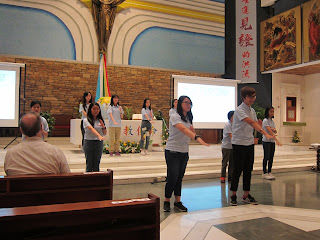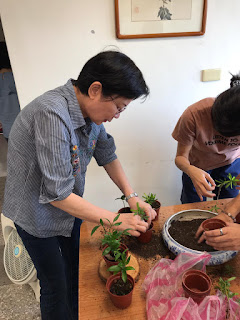I have taken an interest in the films
selected for the Cross-Strait cum Hong Kong and Macao College Student FilmFestival at Cinematheque.Passion. I enjoy the films partly because they satisfy
my curiosity about the skills of young directors still in the infancy of their
exploration into the filmmaking world. My greatest pleasure, however, is attending
the post screening talk. To a certain extent, I find it identical with a class
in the Film Critics Program, from which I have derived so much joy and satisfaction.
Guided by the host, each individual
director shares about his/her experience of film production and the message he/she
wants the film to deliver. And there is inevitably discussion about some
techniques used. To my great satisfaction, some of the techniques mentioned
happen to be those I focused on while watching the film. On the other hand, I
also get happily inspired by some details I have left out.
The interaction between the guest speakers
and the audience is a great highlight, too. It reminds me of the Q & A
session of the Film Critics class. But this time, instead of our lecturer
explaining the techniques, it is the director talking about his own movie. As
mentioned previously, questions usually arise on my mind while watching a film
or afterwards. What can be more delightful than having the questions answered
by the director himself?
During the talk after the movie “The Premise”, I asked a question about its Chinese name “Egg Wash”. In his answer,
the director explained that the expression “egg wash” referred to a deliberate explosion
in protest against an unfavourable condition. In the movie, people throw eggs
at a farmer’s window in an attempt to make him agree to sell his farm. And the
director’s mentor, who was among the audience, further explained the
implication of the expression, referring even to its relation to democratic
movements. This is a detail we audience may not have expected to learn from the
movie.
I was particularly impressed by the
director of a Hong Kong film named “Bomb of Love”. The pretty young girl’s sharing
clarified some of my doubt about the film. Then a lady beside me raised questions
about a few shots used. Obviously a director herself, she spoke so
fast in PuTong Hua that I could not figure out what it was that she wanted to
know. But seemingly without much thinking, the director responded to the
questions fluently, also in PuTong Hua. I marveled at how the young girl took
the challenging questions in stride.
That is why I enjoy the post screening talks
so much. In my opinion, while a well presented movie is already an art of
self-expression, the director’s interaction with the audience is the icing on
the cake.



































